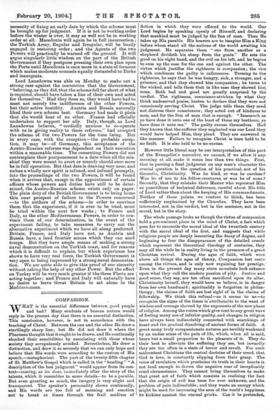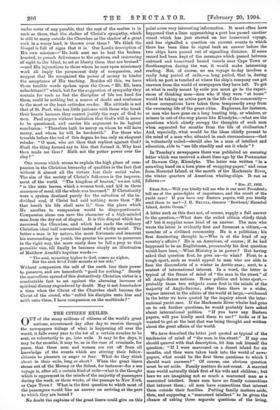COMPASSION.
NvHAT is the essential difference between good people and bad ? Many students of human nature would reply in the present day that there is no essential distinction. This conclusion, however, is not in accordance with the teaching of Christ. Between the one and the other He drew a startlingly sharp line; but He did not draw it where the Pharisees thought that it ought to be drawn, and He continually shocked their sensibilities by associating with those whose society they scrupulously avoided. Nevertheless, He drew a distinction, and drew it so severely that we can only hope and believe that His words were according to the custom of His speech,—metaphorical. The part of the twenty-fifth chapter of St. Matthew's Gospel which is called in the "heading" "A description of the last judgment" would appear from its con- text—coming, as its does, immediately after the story of the talents, which it resembles in some details—to be a parable. But even granting so much, the imagery is very slight and transparent. The speaker's personality shows continually, and His words are too full of meaning and emotion not to break at times through the frail medium of
fiction in which they were offered to the world. Our Lord begins by speaking openly of Himself, and declaring that mankind must be judged by the Son of man. Then He takes up His parable. His hearers are to imagine Him a King before whom stand all the nations of the world awaiting his judgment. He separates them " one from another as a shepherd divideth his sheep from the goats." He sets the good on his right hand, and the evil on his left, and he begins to sum up the case for the one and against the other. The virtue which justifies the righteous is compassion; the vice which condemns the guilty is callousness. Turning to the righteous, he says that he was hungry, sick, a stranger, and a prisoner, and that they showed him compassion ; he turns to the wicked, and tells them that in like case they showed him none. Both bad and good are greatly surprised by the verdict. The righteous, conscience-stricken by what they think undeserved praise, hasten to declare that they were not consciously serving Christ. The judge tells them they need not distress their consciences ; they acted out of kindness to men, and for the Son of man that is enough. " Inasmuch as ye have done it unto one of the least of these my brethren, ye have done it unto me." The guilty excuse themselves. Had they known that the sufferer they neglected was our Lord they would have helped Him, they plead. They are answered in like manner. Failure to recognise Christ is here held to be no fault. It is also held to be no excuse.
However little literal may be our interpretation of this part of the Evangelist's narrative, we cannot, if we allow it any meaning at all, make it mean less than two things. First, that in passing a final judgment on any man's character the, crucial question is the question of his practical, not of his theoretic, Christianity. Was he kind, or was he careless P. Was he of use to his fellow-creatures, or was he of none ? Secondly, that they mistake their Master who represent Him as punctilious of technical deference, careful about His title of Lord rather than about the keeping of His commandments., Neither of these points, we venture to think, has been sufficiently emphasised by the Churches. They have been interested, not in the verdict, but in the sentence, not in the moral, but in the story.
The whole passage looks as though the virtue of compassion held a pre-eminent place in the mind of Christ, a fact which goes far to reconcile the moral ideal of the twentieth century with the moral ideal of the first, and suggests that while religious people are deeply lamenting the decay of dogma, and beginning to fear the disappearance of the detailed creeds which represent the theoretical theology of centuries, they may all the while be in reality living in the presence of a great. Christian revival. During the ages of faith, which were above all things the ages of theory, Compassion lost caste among the virtues, and is only now regaining her prestige.- Even in the present day many stern moralists look askance upon what they call the modern passion of pity. Justice and good sense, they say, are too often sacrificed upon its altar. Christianity herself, they would have us believe, is in danger from her own handmaid ; spirituality is forgotten in philan- thropy; the claims of faith are lost sight of in the claims of fellowship. We think this refusal—as it seems to us—to recognise the signs of the times is'attributable to the want of wisdom and courage showed by the exponents of the new phase of religion. Among the voices which give vent to any great wave of feeling many are of inferior quality, and changes in religion have always been indissolubly connected with searchings of heart and the gradual dissolving of ancient forms of faith. A great many truly compassionate natures are terribly weakened by an undue sense of the pain of life, which, when all is said, bears but a small proportion to the pleasure of it. They do their best to alleviate the suffering they see, but inwardly. they are .too often in a state of terror and revolt. For such malcontent Christians the central doctrine of their creed, that, God is love, is constantly slipping from their grasp. The voice of revelation which proclaims its truth in their hearts is not loud enough to drown the negative roar of inexplicably cruel circumstance. They cannot bring themselves to make that great act of faith which consists in realising the fact that the origin of evil has been for ever unknown, and the. problem of pain indissoluble; and they waste an energy which might be used for increasing the sum of the world's happiness by kickinz against the eternal pricks. Can it be pretended.
under cover of any parable, that the root of the matter is in such as these, that the shelter of Christ's sympathy, which is still to many outside the Churches as the shadow of a great rock in a weary land, is thrown over them ? We think the Gospel is full of signs that it is. Our Lord's description of His own mission—" He bath sent me to heal the broken- hearted, to preach deliverance to the captives, and recovering of sight to the blind, to set at liberty them that are bruised" —and His injunctions to those whom he sent upon missionary work all imply the paramount duty of compassion, and suggest that He recognised the power of money to binder the acceptance of His teaching. Besides all this, we have those terrible words spoken upon the Cross, " Eli, Eli, lama sabachthani ? " which, but for the suggestion of sympathy they contain for such as feel the discipline of life too hard for them, could be nothing but a source of doubt and confusion to the most or the least orthodox reader. His attitude is not that of St. Paul, who has little patience with those who break their hearts because they cannot justify the ways of God to men. Paul argues without hesitation that God's will is never to be questioned, and carries his argument to its logical conclusion : " Therefore hath he mercy on whom he will have mercy, and whom he will he hardeneth." For those who tremble before the rod of this dogma he has only an eloquent rebuke : " 0 man, who art thou that repliest against God ? Shall the thing formed say to him that formed it, Why bast thou made me thus ? Hath not the potter power over the clay ? "
One reason which seems to explain the high place of com- passion in the Christian hierarchy of qualities is the fact that without it almost all the virtues lose their social value. The aim of the society of Christ's followers is the improve- ment of the world. " The kingdom of heaven," we are told, "is like unto leaven, which a woman took, and hid in three measures of meal, till the whole was leavened." If Christianity were a system destined purely for the salvation of the in- dividual soul, if Christ had said nothing more than " He that loseth his life shall save it," then the place which He ascribes to compassion would be disproportionate. Compassion alone can save the character of a high-minded man from the dry-rot of disgust. It is this disgust which has narrowed the Churches, and which has made the ordinary Christian ideal half conventual instead of wholly social. The better a man is by nature, the more fortunate and innocent his surroundings in youth, the greater his power to persevere in the right way, the more easily does he fall a prey to this parasitic vice, till finally he becomes simply an illustration of Matthew Arnold's hopeless words :-
" The soul, mounting higher to God, comes no nigher, But the arch fiend Pride mounts at her side."
Without compassion the salt of the earth lose their power to preserve, and are henceforth " good for nothing." Surely the marvellous spread of this distinctively Christian virtue is a comfortable fact to set against the alarming increase of spiritual dismay engendered by doubt. May it not foreshadow a time when the Christ of the Churches shall become the Christ of the crowd, who "called his disciples unto him and saith unto them, I have compassion on the multitude ?"











































 Previous page
Previous page